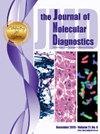A Systematic Method to Detect Next-Generation Sequencing–Based Microsatellite Instability in Plasma Cell-Free DNA
IF 3.4
3区 医学
Q1 PATHOLOGY
引用次数: 0
Abstract
Microsatellite instability (MSI) detection using tumor tissue is a well-established prognostic and predictive biomarker for certain types of cancers. However, tumor tissue samples are less convenient to obtain than blood plasma samples. The main challenge facing next-generation sequencing–based MSI detection in blood plasma samples is the ultralow signal/noise ratio in plasma cell-free DNA (cfDNA). To address the challenge, plasmaMSI, a highly accurate cfDNA MSI detection method, is introduced with three novel performance-improving features: i) a set of stringent locus selection criteria to select loci with high robustness and compatibility across sequencing platforms; ii) a new deduplication strategy that greatly improves the signal/noise ratio for MSI detection; and iii) an MSI calling algorithm that customizes the baseline for each test sample based on its duplication rate. Through analytical validation in diluted cell line samples, the limit of detection of plasmaMSI was determined to be 0.15%. Furthermore, in analyzing 95 evaluable cfDNA samples from patients with gastrointestinal cancers, plasmaMSI exhibited a positive percentage agreement of 92.9% (39/42) and a negative percentage agreement of 100% (53/53) with tissue MSI-PCR. plasmaMSI provides novel solutions to key challenges in cfDNA MSI detection that have not been addressed by existing methods. It has also been systematically validated and is already used in clinical testing for patients with cancer.
一种在无浆细胞DNA中检测下一代基于测序的微卫星不稳定性的系统方法:plasmaMSI。
使用肿瘤组织检测微卫星不稳定性(MSI)是一种公认的预测某些类型癌症的预后和预测性生物标志物。然而,与血浆样本相比,获得肿瘤组织样本更不方便。下一代基于测序的血浆样品MSI检测面临的主要挑战是血浆无细胞DNA (cfDNA)的超低信噪比。为了应对这一挑战,plasmaMSI(一种高精度的cfDNA MSI检测方法)引入了三个新的性能改进特征:1)一套严格的位点选择标准,以选择具有高鲁棒性和跨测序平台兼容性的位点;ii)一种新的重复数据删除策略,大大提高了MSI检测的信噪比;以及iii)基于其重复率自定义每个测试样本的基线的MSI调用算法。通过稀释细胞系样品的分析验证,确定血浆mamsi的检出限为0.15%。此外,在分析来自胃肠道癌症患者的95份可评估的cfDNA样本时,血浆mmamsi与组织MSI-PCR的阳性率为92.9%(39/42),阴性率为100%(53/53)。plasmaMSI为cfDNA MSI检测中的关键挑战提供了新的解决方案,这些挑战是现有方法无法解决的。它还得到了系统的验证,并已用于癌症患者的临床试验。
本文章由计算机程序翻译,如有差异,请以英文原文为准。
求助全文
约1分钟内获得全文
求助全文
来源期刊
CiteScore
8.10
自引率
2.40%
发文量
143
审稿时长
43 days
期刊介绍:
The Journal of Molecular Diagnostics, the official publication of the Association for Molecular Pathology (AMP), co-owned by the American Society for Investigative Pathology (ASIP), seeks to publish high quality original papers on scientific advances in the translation and validation of molecular discoveries in medicine into the clinical diagnostic setting, and the description and application of technological advances in the field of molecular diagnostic medicine. The editors welcome for review articles that contain: novel discoveries or clinicopathologic correlations including studies in oncology, infectious diseases, inherited diseases, predisposition to disease, clinical informatics, or the description of polymorphisms linked to disease states or normal variations; the application of diagnostic methodologies in clinical trials; or the development of new or improved molecular methods which may be applied to diagnosis or monitoring of disease or disease predisposition.

 求助内容:
求助内容: 应助结果提醒方式:
应助结果提醒方式:


